CAIRO — Egypt’s Presidential Election Renews Protests in Tahrir Square
ø
CAIRO, EGYPT–With voting set to start Wednesday, supporters of candidates and a spectrum of advocacy groups converge on Tahrir Square, the cradle of the 2011 Egyptian Revolution, for last-minute campaigning and debates. Polls point to uncertainty over the outcome of Egypt’s upcoming presidential election. Security forces stationed near the site are cautious and on alert as crowds grow nearing the first round of balloting.

Egypt’s Presidential Election Primaries Renew Protests in Tahrir Square. Cairo, Egypt. May, 2014. © K. Lee Lerner ©LMG. All commercial rights reserved
Although differing in aspirations for the revolution, Egyptians interviewed argued that the revolution’s future was equally uncertain, hinging in part on which parties and leaders will first exercise post-military control of the country.
An initial field of 13 candidates narrowed slightly to 11 candidates left contesting the race. With official campaigning set to end Sunday, political experts broadly claim that informal use of social media will be key to a candidate’s chances to make the expected runoff.

Egypt’s Presidential Election Primaries Renew Protests in Tahrir Square. Cairo, Egypt. May, 2014. © K. Lee Lerner ©LMG. All commercial rights reserved
If no candidate polls more than 50 percent of the vote the top two candidates will square off in a runoff set for 16 and 17 June.
The last day of open campaigning prior to a 48 hour pre-election period of silence fueled debates in the Square as to whether groups not directly associated with the campaigns would continue to gather in Tahrir Square and in other public venues.
With limits on campaign spending, most candidates relied heavily on public gatherings to deliver their message to voters.
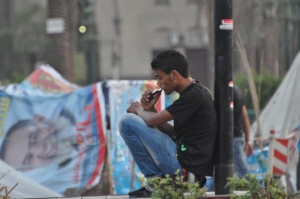
Egypt’s Presidential Election Primaries Renew Protests in Tahrir Square. Cairo, Egypt. May, 2014. © K. Lee Lerner ©LMG. All commercial rights reserved
Social media is increasingly a political battleground. Waly Dolaty, a lawyer and international investment specialist who said he was present in Tahrir Square during the 2011 revolution, said that social media “played an essential part in the revolution.” Interviewed while traveling to Cairo via London from his current home in Kuwait in order to vote in Egypt’s pending Presidential election, Dolaty (speaking in English) said, “In the past you needed secret ways to connect people in order to gather and influence them. What Facebook and Twitter created was a virtual Tahrir Square, and in this virtual Tahrir Square people discussed everything. Facebook turned Egypt into a big conference call.”
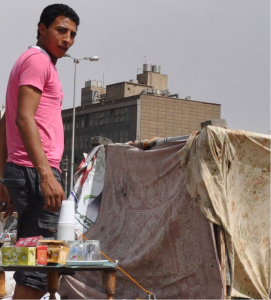
Micro-entrepreneurship in the protest camp at Tahrir Square. Cairo, Egypt. May, 2014. © K. Lee Lerner ©LMG. All commercial rights reserved
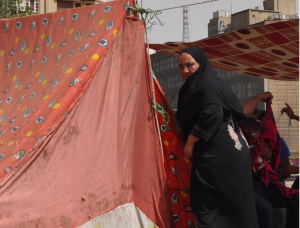
Cairo, Egypt.– Egypt’s Presidential Election. Tahrir Square, Cairo, Egypt. May, 2014. © K. Lee Lerner ©LMG. All commercial rights reserved May 2012. All commercial rights reserved
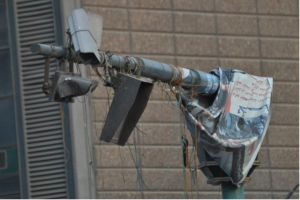
Crowds broke cameras and lights to post protest banners. — K. Lee Lerner Egypt’s Presidential Election. Tahrir Square, Cairo, Egypt. May 2012. All commercial rights reserved
Crowds broke cameras and lights to post protest banners. –K. Lee Lerner Egypt’s Presidential Election. Tahrir Square, Cairo, Egypt. May 201
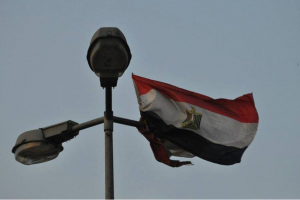
Crowds broke cameras and lights to post protest banners. –K. Lee Lerner Egypt’s Presidential Election. Tahrir Square, Cairo, Egypt. May 20, 2012
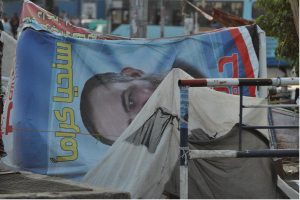 Polls point to uncertainty over the outcome of Egypt’s upcoming presidential election. Egypt’s Presidential Election Primaries Renew Protests in Tahrir Square. Cairo, Egypt. May, 2014. © K. Lee Lerner ©LMG. All commercial rights reserved.
Polls point to uncertainty over the outcome of Egypt’s upcoming presidential election. Egypt’s Presidential Election Primaries Renew Protests in Tahrir Square. Cairo, Egypt. May, 2014. © K. Lee Lerner ©LMG. All commercial rights reserved.
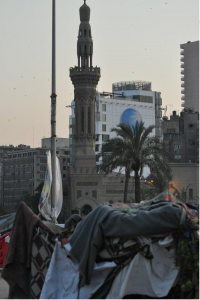
“Although differing in aspirations for the revolution, Egyptians interviewed argued that the revolution’s future was equally uncertain, hinging in part on which parties and leaders will first exercise post-military control of the country.” –K. Lee Lerner. Egypt’s Presidential Election Primaries Renew Protests in Tahrir Square. Cairo, Egypt. May, 2014. © K. Lee Lerner ©LMG. All commercial rights reserved
Egypt’s Presidential Election Primaries Renew Protests in Tahrir Square. Cairo, Egypt. May, 2014. © K. Lee Lerner ©LMG. All commercial rights reserved

The last day of open campaigning prior to a 48 hour pre-election period of silence fueled debates in the Square as to whether groups not directly associated with the campaigns would continue to gather in Tahrir Square and in other public venues. Egypt’s Presidential Election Primaries Renew Protests in Tahrir Square. Cairo, Egypt. May, 2014. © K. Lee Lerner ©LMG. All commercial rights reserved.
* * *

Presidential election Protests Renew Unrest in Tahrir Square. Cairo, Egypt. May, 2014. © K. Lee Lerner ©LMG. All commercial rights reserved
Lee Lerner’s portfolio covering science and global issues includes multiple RUSA Book and Media Awards, books named Outstanding Academic Titles, and two global circumnavigations. He serves as an advisor, editor, and contributor to respected international news and academic resources.
Photo Credits: Tahrir Square, Cairo, Egypt. And other Cairo locations. May 2012 Photos by © K Lee Lerner ©LMG All commercial rights reserved.
Additional information and selected writings are available at scholar.harvard.edu/kleelerner and via harvard.academia.edu/kleelerner


